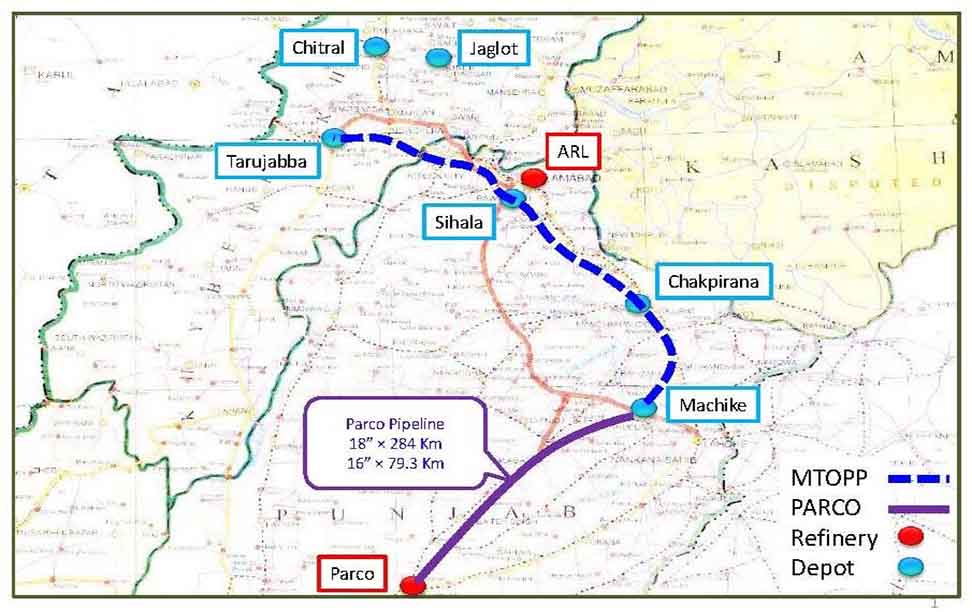Govt assures to build TAPI project in full compliance of national and int'l environmental laws

By MG News | Category Economy | May 15, 2018 at 04:31 PM GMT+05:00
Audience of the National Scoping Workshop on Tuesday on the Environmental and Social Impact Assessment (ESIA) process of TAPI Gas Pipeline Project were given firm assurance that government would fully support building of 825 kilometres-long Pakistan section of TAPI gas pipeline project in full compliance of international, national and provincial environmental laws of country.
The firm assurance came from Romina Khurshid Alam, parliamentary secretary for Federal Ministry of Climate Change, while speaking at the National scoping workshop held as part of Environmental & Social Impact Assessment (ESIA) Study of TAPI Pipeline project in Pakistan. M/s. Environmental Management Consultants (EMC) Pakistan organized the workshop as being local associate of international consortium of consultants M/s. MAB, M/s. Naftec and M/s. Jacobs working on ESIA of total 1,814 kms-long Turkmenistan-Afghanistan-Pakistan-India (TAPI) gas pipeline project.
“It is my pledge that Government of Pakistan will fully support TAPI Gas Pipeline project vis-à-vis ensuring compliance to Environmental Acts, Rules, and Regulations both at Federal and Provincial levels,” said Miss Khurshid Alam on the occasion.
“Do share with us whatever are the recommendations and deliberations of this workshop so to incorporate them in our plan to build this project to mitigate to the maximum possible extent any adverse social and environmental impacts of this pipeline project,” said the parliamentary secretary for Climate Change.
She said federal government would provide full assistance and coordination so that TAPI pipeline project was built in accordance with different provincial environmental laws, guidelines, and regulations as after the 18th Constitutional Amendment the subject of the environment had been fully devolved to the provinces.
Muhammad Shakeel Malik, additional secretary of Ministry of Climate Change, said that construction of TAPI project would emerge as national level bench mark of compliance with environmental standards and regulations.
He said the transnational gas pipeline project would also emerge as a supreme example of regional cooperation to overcome persisting energy shortfall in Pakistan and in neighboring countries.
He said government would fully make sure that construction and operation of TAPI project in Pakistan should fully comply with National Environmental Quality Standards and rules and regulations of environmental watchdogs of Balochistan and Punjab-the two provinces in Pakistan from which gas pipeline would pass through.
“This scoping workshop would be helpful in meeting the national, provincial, and local level environmental requirements as stipulated in the law,” said the additional secretary Climate Change.
“These all aspects would be taken care of well in the ESIA study being conducted for the project to suggest the best mitigation measures to lessen harmful impacts on environment, flora, fauna, natural resources, and habitat of these areas,” he said.
He said that proper air quality, noise, physical environmental, ecological surveys, socio-economic, human resettlement surveys would be carried out in sample areas of the country to conduct ESIA for the project as being a lawful requirement.
Former chief of Pakistan EPA said that a series of consultative workshop would be held at the national, provincial, and district levels with the concerned government departments, civil society organizations, academia, and research organizations to make the 10 billion US Dollars-project meet the lawful, socio-economic, cultural, and archeological, and heritage requirements of areas of Pakistan through which it would pass through.
Meanwhile, audience of the workshop especially those from Balochistan asked about measures taken to safeguard environment, wildlife, national parks, and water resources of the province especially in those areas where the gas pipeline would pass through.
The concerned participants also asked about the possible socio-economic benefits the projects would generate for the backward areas of Balochistan and also about possible share of the province in the gas supply Pakistan would receive after commissioning of the project.
Mr. Majdi Salameh, Dr. Wael, Mr. Shams Ul Haq Memon, Mr. Azhar Saif, Mr. Farooq Qamar, Dr. Ijaz, Dr. Irfan Khan, Dr. Aleem Chaudhry, representatives from ADB and World Bank, forest and wildlife departments and NGOs also spoke at the occasion.
Related News
| Name | Price/Vol | %Chg/NChg |
|---|---|---|
| KSE100 | 121,641.00 407.56M |
-0.13% -157.87 |
| ALLSHR | 75,951.71 854.04M |
-0.10% -76.82 |
| KSE30 | 36,827.89 67.82M |
-0.42% -156.03 |
| KMI30 | 181,199.42 117.76M |
-0.38% -696.40 |
| KMIALLSHR | 52,088.08 592.55M |
-0.27% -143.41 |
| BKTi | 29,808.04 22.21M |
-0.83% -249.97 |
| OGTi | 27,075.99 4.68M |
-0.75% -203.95 |
| Symbol | Bid/Ask | High/Low |
|---|
| Name | Last | High/Low | Chg/%Chg |
|---|---|---|---|
| BITCOIN FUTURES | 105,980.00 | 106,960.00 105,745.00 |
1210.00 1.15% |
| BRENT CRUDE | 66.40 | 66.69 66.36 |
-0.07 -0.11% |
| RICHARDS BAY COAL MONTHLY | 90.00 | 90.75 90.00 |
0.00 0.00% |
| ROTTERDAM COAL MONTHLY | 101.80 | 102.40 101.00 |
1.25 1.24% |
| USD RBD PALM OLEIN | 998.50 | 998.50 998.50 |
0.00 0.00% |
| CRUDE OIL - WTI | 64.51 | 64.86 64.47 |
-0.07 -0.11% |
| SUGAR #11 WORLD | 16.51 | 16.59 16.32 |
-0.06 -0.36% |
Chart of the Day
Latest News
Top 5 things to watch in this week
Pakistan Stock Movers
| Name | Last | Chg/%Chg |
|---|
| Name | Last | Chg/%Chg |
|---|




 Central Government Debt
Central Government Debt